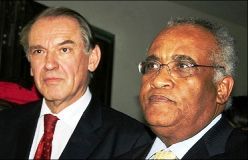UN, AU envoys to Darfur say peace deal can be modified
Feb 15, 2007 (KHARTOUM) — The U.N. and African Union envoys to Darfur said Thursday that they were “encouraged” about prospects for peace in the country’s troubled region after two days of talks with factions in Sudan.
 The two – the U.N.’s special envoy tasked with re-energizing the Darfur peace process, Jan Eliasson, and the A.U.’s Salim Ahmed Salim – have been in Sudan this week for meetings with Khartoum officials, rebel leaders and stops in Darfur.
The two – the U.N.’s special envoy tasked with re-energizing the Darfur peace process, Jan Eliasson, and the A.U.’s Salim Ahmed Salim – have been in Sudan this week for meetings with Khartoum officials, rebel leaders and stops in Darfur.
“We are encouraged by the initial reaction of everyone we have met on this issue of reduction of the escalation of violence” in Darfur, Salim told reporters.
There was a “readiness” by all to improve the Darfur Peace Agreement signed last May in Abuja, Nigeria, but which had failed to end the fighting, he said.
“The ultimate goal was to reach peace on the ground, and since this has not been yet achieved, the various parties have to agree to improving it,” Salim said, adding that the Abuja agreement was nevertheless “very important.”
“It is not a perfect agreement and no agreement is perfect. It is not like the Quran or the Bible that you cannot change or modify,” he said.
The U.N.’s Eliasson said he expected a “visible sign of reduction of violence” after the mediation by the two and efforts to bring parties that did not sign the peace deal on board.
“The situation in Darfur is very serious,” Eliasson said, adding that it was evident that all factions recognize there can be no military solution to Darfur. “The only solution should be a political one.”
Eliasson also warned against fatigue prevailing among humanitarian workers in Darfur.
“There is an element of urgency, that we think this is an opportunity which should be taken by all,” Eliasson said. Missing such an opportunity would be a “very serious mistake.”
Salim and Eliasson also expressed hope the government in Khartoum would allow a U.N. human rights team to enter the country on a fact-finding mission to Darfur.
That rights team said Wednesday it would cancel a planned visit to assess alleged atrocities in Darfur because Khartoum had failed to give them visas and they could not wait indefinitely in the Ethiopian capital, Addis Ababa, where they have been stuck since Feb. 11.
The Darfur conflict began in early 2003, when ethnic African tribes revolted against the Khartoum government, which was accused of unleashing Arab militiamen blamed for rapes and killings. At least 200,000 people have died. The U.S. government has described the violence as genocide.
A 7,000-strong African Union peacekeeping force has been trying to quell the ongoing violence, but the force is underfunded and ill-equipped.
Khartoum has rejected a U.N. Security Council resolution calling for 22,000 U.N. peacekeepers to replace the A.U. force in Darfur but has sent mixed signals about a joint U.N.-A.U. force.
The Darfur Peace Agreement, signed in May in Abuja, Nigeria, called for a cease-fire, disarmament of militias and a protection force for civilians – but did not specify the composition of such a force.
The deal was supposed to help end the conflict, but instead sparked months of fighting between rival rebel factions, although fighting between Sudanese armed forces and the Sudan Liberation Army, or SLA, the main rebel group, has decreased since the deal. Rebels who do not support the Abuja accord include a breakaway faction of the SLA and the Justice and Equality Movement.
(AP)
